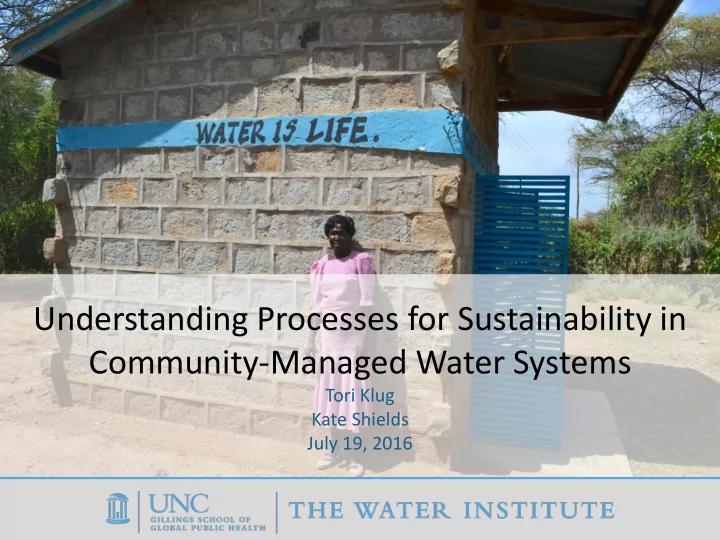

Processes for Sustainability of Community-Managed Water Supply Systems Understanding Processes for Sustainability in Tori Klug Community-Managed Water Systems Kate Shields Tori Klug July 19, 2016 Kate Shields July 19, 2016
Outline • Study goals • Methods • Results and recommendations • Questions and discussion Results and Background Methods Questions recommendations
Background: Study goals • Assess World Vision’s Community Engagement Strategy • Explore how and why certain water systems are functional • Inform best practices that facilitate successful management Results and Background Methods Questions recommendations
Methods • 3 study countries – Ghana, Kenya, and Zambia • Community selection criteria: – Water system implemented by World Vision (WV) – WaSH committee in existence – System functional at time of baseline evaluation Results and Background Methods Questions recommendations
Methods • Qualitative • Inductive approach – Hypothesis-building – Themes emerge from data – Framework not predetermined – Focus on perspective of study participants without forcing preconceptions • “Deep dive” – Explore processes that are not captured in quantitative studies Results and Background Methods Questions recommendations
Methods Number of Activity Type Participant(s) recordings Water Committee Member 92 World Vision Staff 34 Individual Community Member 69 Interviews Other Local Leader 49 Post-Construction Support Provider 23 Water Committee Members 19 Focus Group Discussions Community Members 20 Grand Tour and Community Mapping 18 Total Number of Recordings 324 Total Hours of Recordings 237 hours Results and Background Methods Questions recommendations
Results: Themes • Committee characteristics • Community engagement and training • Participation and ownership • Resource mobilization • Social capital • Hardware and management rehabilitation Results and Background Methods Questions recommendations
Results: Ownership and participation Financial contributions Committee and community participation Meetings Physical and decision labor making Results and Background Methods Questions recommendations
Results: Ownership and participation • Balanced participatory approach by external support actors • Includes: – Encouraging a sense of ownership – Troubleshooting when challenges are above community capacity – Building regional water associations – Considering context including existing structures Results and Background Methods Questions recommendations
Recommendations: Ownership and participation • Maintain a context-specific balanced participatory approach • Sensitize local leaders in the importance, role, and autonomy of the water committee • Encourage local leaders to engage their community members in management decision- making, particularly before construction • Support the formation of regional water committee associations Results and Background Methods Questions recommendations
Results: Women and water management • Higher level of trust for female treasurers • Women are sometimes prevented from maintaining active and meaningful involvement in water management • Women are often the first to recognize water system breakdowns Results and Background Methods Questions recommendations
Recommendations: Women and water management • Ensure that women are better represented in water committee executive positions • Emphasize why women should be actively involved in water management in water committee training sessions • Encourage active participation of female committee and community members in water management decision-making • Train women to be able to recognize water system breakdowns and on proper water system operation and preventing common causes of water system breakdown Results and Background Methods Questions recommendations
Results: Resource mobilization Resource mobilization for water systems Mobilization Mobilization of Mobilization of Mobilization of Water fee community community of community personal assets assets institutions labor Proactive Reactive Community Regular fee contributions Pay-as-you- Loan go Fine Results and Background Methods Questions recommendations
Results: Resource mobilization Resource mobilization for water systems Mobilization Mobilization of Mobilization of Mobilization of Water fee community community of community personal assets assets institutions labor Proactive Reactive Community Regular fee contributions Pay-as-you- Loan go Fine Results and Background Methods Questions recommendations
Recommendations: Resource mobilization • Adapt financial training for water committees to be more inclusive of these alternative options for resource mobilization to promote sustainability and equity • Explicitly address equity issues in resource mobilization training • Encourage communities to proactively (rather than reactively) mobilize resources Results and Background Methods Questions recommendations
Social Capital • Informal social networks • Formal community organizations • General sense of trust and interdependency within community Collective Action Resource Mobilization • • Financial and/or material Communal labor during system construction contribution during construction • • Financial contributions towards Identification and training of committee operation and maintenance • • Assistance from other Communal problem solving and participation during community organizations rehabilitation process (hardware and management) Water System • Committee participation in system governance Maintenance and Rehabilitation • Money available for repair and rehabilitation • O&M and rehabilitation activities • Knowledge pooling • Sense of ownership
Overall recommendations • Actors who provide support to community- managed water systems can enable communities to enter a cycle of success by: – Using participatory approaches – Building capacity of committee members – Emphasizing community and committee ownership – Providing balanced support Results and Background Methods Questions recommendations
Acknowledgements Project team Funding sources Kate Shields, Tori Klug, Ryan Cronk, Nikki Behnke, Emma Kelly, Kristen Lee, Leah Everist, Julian Oliver Qualitative research guidance Peggy Bentley, Vidya Venkataramanan, Valerie Flax Project support World Vision US: Greg Allgood, Jordan Smoke AWWA Larson Aquatic Master’s Research World Vision International: Ashley Labat Support World Vision Kenya: National and ADP offices UNC Master’s Merit Assistantship World Vision Zambia: National and ADP offices Jon Curtis Student Enrichment Fund World Vision Ghana: National and ADP offices UNC Class of 1938 scholarship
Questions? Results and Background Methods Questions recommendations
Recommend
More recommend